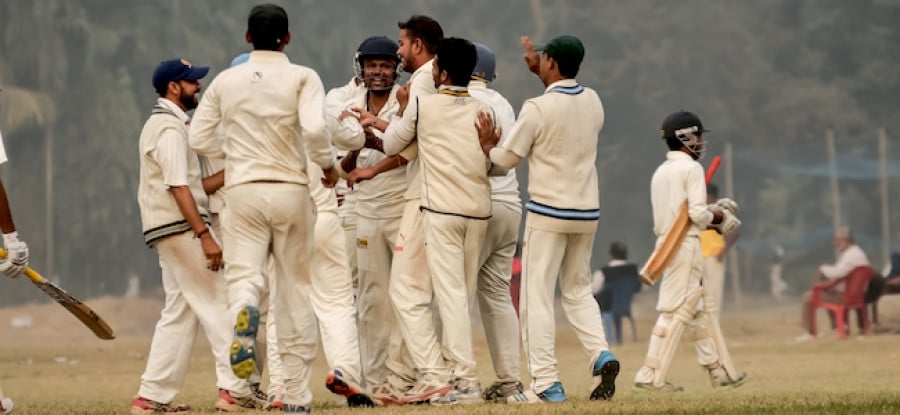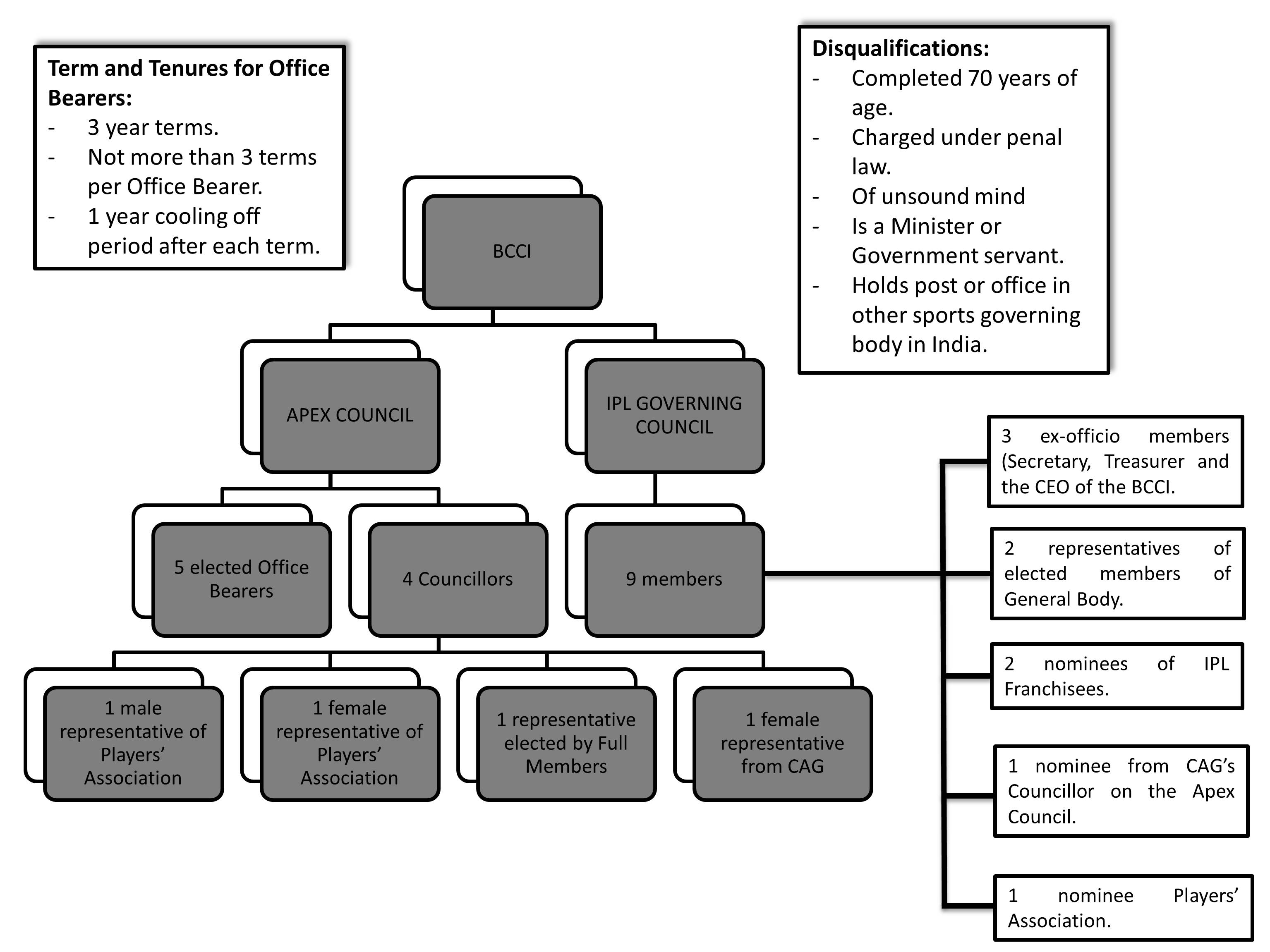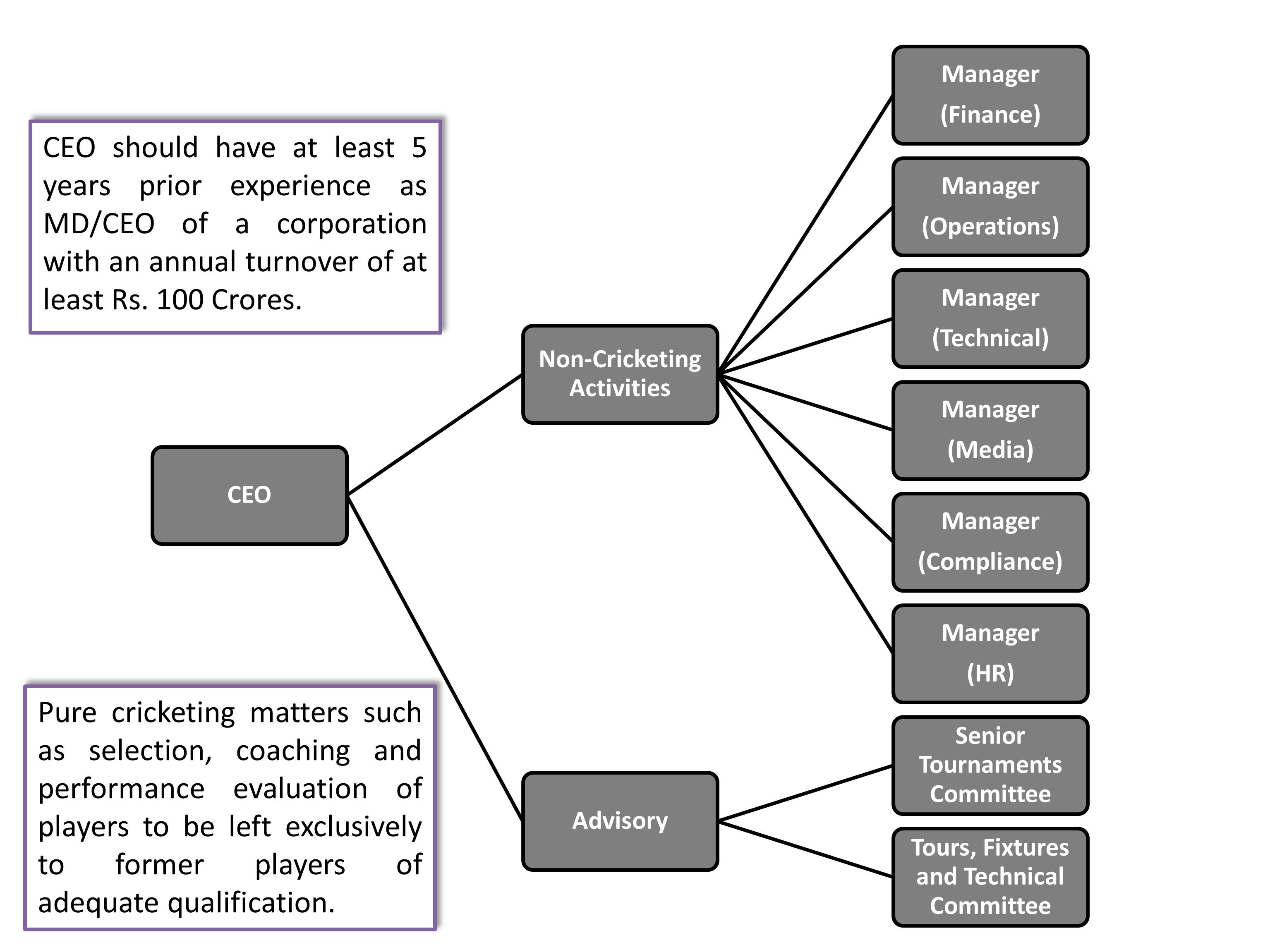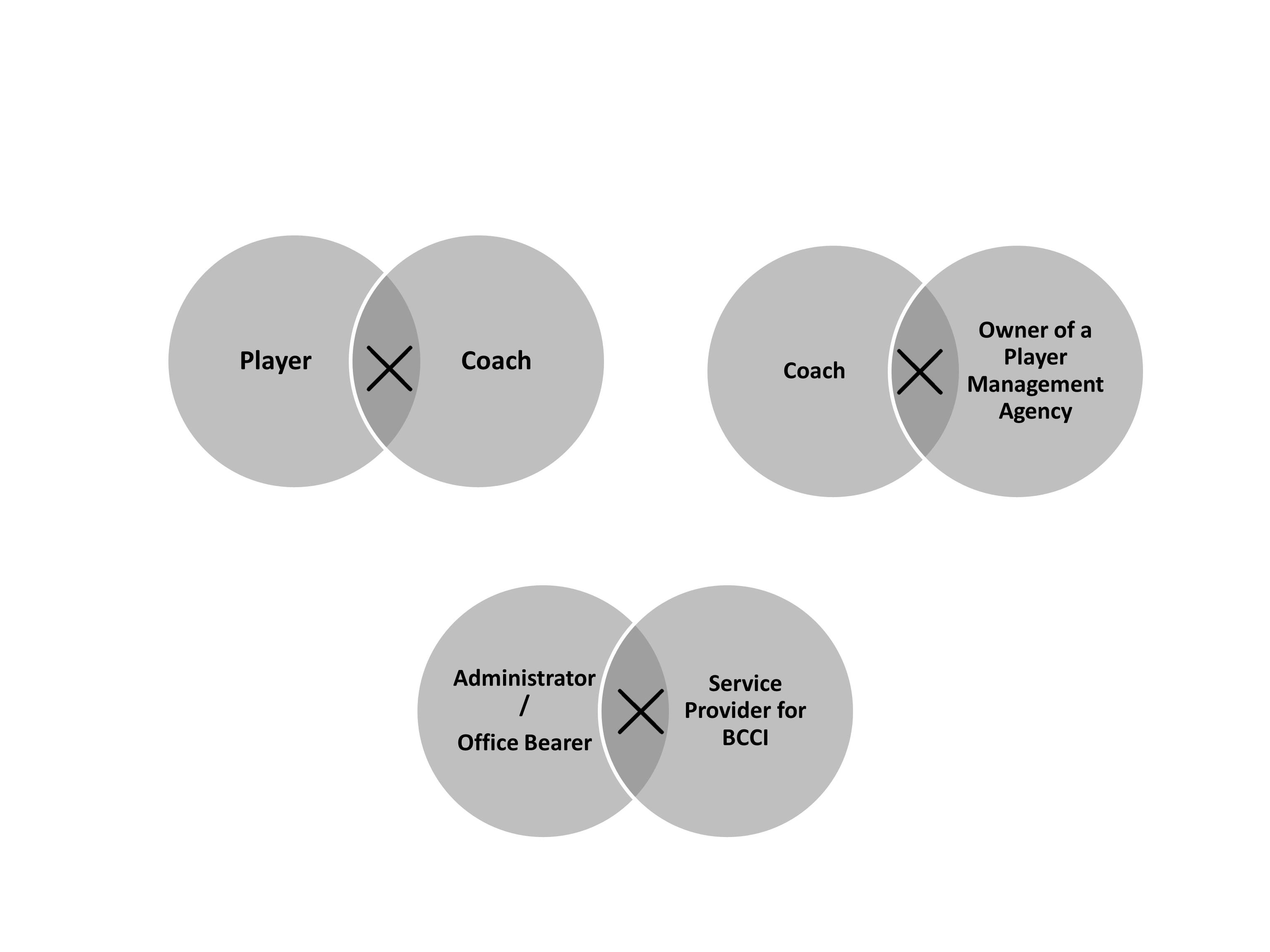The impact of the Lodha Committee BCCI report on sports governance in India

This was first written for and published by The Sports Law & Policy Centre.
An earlier version of this article was published as “Playing In The Corridor Of Uncertainty: The Impact Of The Justice R.M. Lodha Committee Report on Sports Governance In India” in the publication 'Game, Set and Matchless...A Reader on Sports Law' published by the National Law School of India University in 2016.
I. INTRODUCTION
On January 4, 2016, the Justice R.M. Lodha Committee (“Committee”) presented its "Report on Cricket Reforms" (the “Report”) to the Supreme Court of India. The Committee, which comprised of Mr. Justice (Retd.) R.M. Lodha, former Chief Justice of India, and former Supreme Court judges, Mr. Justice (Retd.) Ashok Bhan and Mr. Justice (Retd.) R.V. Raveendran, was constituted and appointed by the Hon’ble Supreme Court in its order dated 22nd January 2015, while disposing of Civil Appeal No. 4235 of 2014 (Board of Control for Cricket in India vs. Cricket Association of Bihar) and two other appeals (the “January Order”).

Figure 1: Lodha Committee – Timeline of Significant Events
While the Committee was primarily constituted to provide its recommendations in the aftermath of the findings presented by the Justice Mudgal Probe Panel in relation the 2013 Indian Premier League (“IPL”) spot fixing scandal, it was also mandated to examine and make suitable recommendations to the Board of Control for Cricket in India (“BCCI”) for such reforms in its functioning and practices as may be considered necessary and appropriate with the aim of, amongst other things, preventing sporting frauds and conflict of interests, improving player welfare, streamlining the functioning of the BCCI, and making it more responsive and accountable to the public at large.
Through the Report, the Committee recommended a substantial overhaul of the manner in which the BCCI, and cricket in general, is governed and administered in India. In preparing the Report and in attempting to provide a comprehensive list of reforms, the Committee sought interviews and comments from several stakeholders and interested parties, including former and current sportspersons, administrators, regulators and lawyers. The recommendations provided under the Report are classified under ten (10) broad heads, each of which the Committee considered integral for the governance of cricket in the country.
In the following section, we provide a brief overview and summary of the significant recommendations made by the Committee in the Report. Thereafter, in Section III we attempt to analyse a few of the key aspects of the Report and the potential ramifications and impact that the Report’s recommendations, may have on Indian cricket in particular and sports administration in India more generally. Section IV summarises the subsequent legal developments post the release of the Report and the current status of implementation of the Supreme Court’s orders, and Section V concludes the article.
II. OVERVIEW OF RECOMMENDATIONS
A. Structure of the BCCI
The Committee highlighted seven (7) primary issues with the current structure of the BCCI. These were:
- the lack of representation of all Indian states in the BCCI;
- disparity and over-representation of certain states (such as Maharashtra and Gujarat);
- representation of teams rather than territories by certain members (such as Services and Railways);
- representation of recreational clubs rather than teams or territories by certain members (such as the Cricket Club of India (CCI));
- absence of representation of Union Territories;
- ad-hoc creation of membership categories – Affiliate Members and Future Members; and
- arbitrary addition and removal of member associations.
In this respect, the Committee made the following recommendations:
- Implementation of a "One State – One Member – One Vote" policy, keeping in mind the standards followed by most international sports governing bodies. In the event of multiple state associations or teams from a single state (as is the case in Gujarat and Maharashtra), a single association to be made a ‘Full Member’, with voting rights and the others may be inducted as "Associate Members", without voting rights.
- Non-state members such as Services, Railways and other similar non-state members to be accorded the status of Associate Members, without voting rights and retaining their right to participate in the relevant domestic tournaments.
- Removal of ‘Affiliate’ and ‘Future Member’ categories (currently accorded to states such as Telangana and Mizoram) with the BCCI to consist of only Full Members and Associate Members.
- With respect to the long standing practice of classifying the BCCI’s members into various Zones (North, South, East, West and Central), the Committee suggested that such Zones should retain their relevance only for the purpose of the tournaments conducted amongst themselves (such as the Duleep Trophy and the Deodhar Trophy) and the Zones should not play a role in the nomination of personnel to run the BCCI or serve in the BCCI’s various Standing Committees, which is the case currently.
- Disbursement of funds by the BCCI to its member associations for cricket development must not be uniform and must be made in accordance with a formalised policy to be notified by the BCCI, aimed at incentivising its members to develop the sport.

Figure 2: Suggested Changes to Membership Structure
B. Governance
The Committee identified several issues with respect to the governance of the BCCI and other cricket associations in the country. These issues included: (a) concentration and abuse of power in certain sections leading to mismanagement; (b) incompetence and lack of experience in office bearers and elected officials; (c) inadequate or lack of representation of former players and women; (d) unlimited terms and tenures for office bearers and officials; and (e) absence of grounds for disqualification from holding posts. The Committee provided the following set of recommendations with respect to the governance of the BCCI:
- Replacement of the existing fourteen (14) member BCCI working committee with an Apex Council (responsible for governing the sport) and a separate IPL Governing Council.
- Constitution of the Apex Council to reflect a balance of representatives and independent members, with nine (9) members – five (5) elected office bearers and four (4) Councillors (one (1) male and one (1) female representative of the players’ association, one (1) representative elected by the Full Members of the BCCI and one (1) representative nominated by the Comptroller and Auditor General of India (“CAG”)).
- The terms and tenures for office bearers of the Apex Council to be fixed, by limiting them to three (3) years at a time and not more than nine (9) years in total in any instance. The Committee also recommended a cooling off period after each term served and prohibited consecutive terms.
- Any person who has: (a) completed seventy (70) years of age; or (b) is charged under penal law; or (c) is declared to be of unsound mind; or (d) is a Minister or Government servant; or (e) holds any post in any other sports body in the country to be disqualified from being a BCCI office bearer.
- Election of BCCI President to be made by all Full Members instead of a rotational basis, depending on the Zone of the candidates, which was the practice adopted earlier.

Figure 3: Recommended Governance Structure
C. Management
In an attempt to ensure professionalism in the management of the BCCI, the Committee suggested the implementation of a corporate structure whereby the BCCI will be managed by “professionals with established skill-sets”.
Some of the significant recommendations made by the Committee with respect to the management of the BCCI include:
- Appointment of a Chief Executive Officer (“CEO”) with strong credentials who will be assisted by a team of a six (6) managers to handle non-cricketing affairs and all non-cricketing and logistical concerns of players. The CEO to ideally have previous managerial experience for five (5) years as the Managing Director/CEO of a corporation with an annual turnover of at least Indian Rupees One Hundred Crores (INR 100,00,00,000/-).
- The large number of Standing Committees and Sub-Committees currently within the BCCI to be reduced to two (2) essential advisory committees (Senior Tournaments Committee and the Tours, Fixtures and Technical Committee) that would advise the CEO with reference to tours, technical aspects and tournaments.

Figure 4: Suggested Management Structure.
- Establishment of seven (7) cricket committees that oversee all selection, coaching, performance and evaluation matters across all categories, including disabled and women’s cricket. Each of the cricket committees to consist of three (3) members who shall be former players/cricketers themselves.
- Selection committee of the men’s senior team to consist of only former test players with the player having the most caps being the head of the committee.
D. Indian Premier League (IPL)
While the Committee recognised the importance of the IPL as a revenue generator for the BCCI, it also recognised the need for a reinforced mechanism of governance in relation to the IPL in light of the various controversies that have emerged over the last few years with respect to the league. The key recommendations made by the Committee with respect to the IPL include:
- Constitution of an IPL Governing Council, comprising of nine (9) members – three (3) ex-officio members (the Secretary, Treasurer and the CEO of the BCCI), two (2) representatives of the elected members of the General Body, two (2) nominees of the franchisees participating in the IPL (“Franchisee”), one (1) nominee of the CAG’s Councillor on the Apex Council and one (1) nominee of the Players’ Association.
- Representation of the Franchisees on the IPL Governing Council to be on an annual rotational basis, ensuring that every Franchisee is nominated at least once before a Franchisee is nominated for a second term.
- All bodies that are appointed under the IPL rules and regulations to consist of members selected by a panel of the BCCI Ombudsman, the Ethics Officer (both discussed in greater detail below) and the CEO.
- A fifteen (15) days break to be provided before and after the IPL season with respect to the national cricket calendar.
E. Players’ Association and Agent Registration
The Committee also proposed the establishment of a players’ association funded and financed by the BCCI to look after and advocate the interests of current and former professionals and the introduction of compulsory registration for player agents. In addition to providing an indicative set of norms to be followed by the BCCI and the players’ association while establishing an agent registration mechanism, the Committee also made the following notable recommendations in this regard:
- The players’ association to be brought into effect by an Honorary Committee consisting of four (4) members, which shall serve as the Steering Committee.
- The Steering Committee to: (a) identify and invite all eligible ex-cricketers to be members of the players’ association; (b) open bank accounts and manage funds for the players’ association; (c) receive funds from the BCCI; (d) conduct the first elections for office bearers; and (e) communicate the names of BCCI player nominees to the BCCI and take all necessary steps in this regard.
F. Conflict of Interest
The Committee observed that there was lack of awareness in relation to conflict of interest situations amongst the majority of its interviewees and also within the BCCI itself. In an attempt to provide a working policy in this regard, the Committee examined the functioning of various international sports bodies and the practices adopted by them in dealing with situations of conflict of interest. The Committee recognised that preventing conflict of interest is integral to the regulation of ethical conduct in sport. In providing its recommendations, the Committee expressly defined five (5) forms of conflict of interest and provided illustrations for each such form for better understanding. Each specific situation of conflict of interest was applied to individuals employed with, or connected to the BCCI with separate solutions or sanctions.
- The forms of conflict of interest contemplated by the Committee in the Report include:
- Direct or Indirect Interest - Where associations with family members, partners or close associates may be seen to compromise an individual’s participation, performance and discharge of his/her roles;
- Compromised Roles – Where an individual’s role may be compromised due to holding two (2) separate or distinct posts or positions in any of the BCCI, a member association, IPL or IPL Franchisees;
- Commercial Conflicts – Where conflicts arise out of commercial relationships with third parties (such as in the case of endorsement contracts) which could compromise the discharge of one’s primary obligations or potentially deface the game;
- Prior Relationship – Where there exists a prior commercial relationship between an individual and/or vendor or service, who is subsequently engaged by the BCCI, its a member association, the IPL or IPL Franchisee; and
- Position of Influence - Where an individual is in a position of influence that may compromise decision making, control or management in relation to such individual’s friends, relatives or close affiliates.
- The Committee has also categorised situations of conflict of interest as either:
- Tractable- which may be resolvable or permissible through recusal of the individual concerned and/or declaration of the interest involved; or
- Intractable - which are unresolvable and would necessitate the removal of the concerned individual from his/her position to cease the conflict of interest.
- The office bearers of the BCCI are required to make full and complete disclosure in writing of any existing or potential event that may lead to a conflict of interest in the discharge of his/her duties. All such information is to be uploaded on the BCCI website in order to maintain transparency and in the event any relevant information is withheld or the office bearer fails to make complete disclosure in this regard, he/she may face disciplinary action.
- The Full Member associations of the BCCI are also required to adopt and observe all the above ethical principles including those concerning conflict of interest.
- The conflict of interest provisions are intended to apply to all individuals who are a part of the game either as players, or management, or in any other capacity. For the sake of clarity, the Committee has recommended that under no circumstances should an individual hold more than one (1) of the following posts in the BCCI and national cricket ecosystem at the same time:
- Player (current);
- Selector / Member of Cricket Committee;
- Team Official;
- Commentator;
- Match Official;
- Administrator / Office Bearer;
- Electoral Officer;
- Ombudsman & Ethics Officer;
- Auditor;
- Any person who is involved with the governance, management or employment of an IPL Franchisee;
- Member of a Standing Committee;
- CEO and Managers;
- Office Bearer of a Member;
- Service Provider (Legal, Financial, etc.);
- Contractual entity (Broadcast, Security, Contractor, etc.); and
- Owner of a Private Cricket Academy.

Figure 5: Conflict of Interest Situations
G. External Supervision
The Committee recommended the creation of three (3) new authorities to provide external supervision and oversight of the BCCI’s functions. These three (3) authorities are as follows:
- Ombudsman – The Ombudsman to be a retired Supreme Court judge or a former Chief Justice of a High Court, appointed on an annual basis at the BCCI’s Annual General Meeting (AGM). The Ombudsman shall, either on a reference by the Apex Council or on a complaint by a member association/Franchisee/Zone/players’ association/ Player/Team Official/ Administrator or on a suo motu basis, investigate and resolve any dispute between or among these entities by following due principles of natural justice, production of evidence and fair hearing. The Ombudsman may also entertain and redress any grievance or complaint by members of the public if such grievances or complaints concern ticketing, access and facilities at stadia and lack of transparency in the award of contracts for goods and services.
- Ethics Officer – The Ethics Officer to be a former Judge of a High Court and shall be responsible for instituting additional guidelines or bye-laws on ethics, initiating investigation or adjudicatory proceedings and awarding warnings, fines, reprimands, suspensions or recommended other actions to the BCCI.
- Electoral Officer–The Electoral Officer to be a former Election Commissioner of India and be responsible for scrutinizing nominations and clearing them, drawing up and verifying the electoral roll after identifying appropriate representatives of the Full Members, ensuring that no candidate falls foul of the BCCI’s rules, conducting elections to the Committees under the rules and declaration of results. The decision of the Electoral Officer is to be final and conclusive in relation to these matters.

Figure 6: Independent Officers
H. Transparency and Oversight
While recognising the lack of transparency and oversight within the processes previously established by the BCCI, the Committee made several recommendations with respect to the BCCI’s functioning, including the following:
- The Legislature was asked to consider bringing the BCCI within the purview of the Right to Information Act, 2005 (“RTI Act”).
- Revision of all existing contracts of the BCCI as the Committee was of the view that the BCCI does not have fair and transparent criteria for awarding contracts or appointment of auditors and lawyers.
- Establishment of fixed norms and procedures for engagement of service professionals and contractors, and ensuring full transparency of all tenders floated and bids invited by or on behalf of the BCCI.
- Clear principles of transparency to be laid down, and the BCCI website and office to carry all rules, regulations and office orders of the BCCI, the constitution of the various committees, their resolutions, the expenditures under various heads, the reports of the Ombudsman/Auditor/Electoral Officer/Ethics Officer and the annual reports and balance sheets.
- Several recommendations in relation to advertisements during the broadcast of cricket matches, including that the entire space of the screen during the broadcast to be dedicated to the display of the game, save for a small sponsor logo or sign. Further, the Committee recommended that advertisements may be permitted during broadcasts only in breaks taken by both teams for drinks, lunch and tea, as is the practice internationally. In this regard, the Committee opined that broadcasters cut away to commercials at the stake of the game thus, depriving the viewers of on-field activity in between overs and on occasions, during the overs as well.
I. Match Fixing and Betting
To continue reading or watching login or register here
Already a member? Sign in
Get access to all of the expert analysis and commentary at LawInSport including articles, webinars, conference videos and podcast transcripts. Find out more here.
- Tags: Anti-Trust | Board of Control for Cricket in India (BCCI) | Competition Law | Cricket | Governance | India | Regulation
Related Articles
- A review of the IPL and BCCI spot-fixing scandal – governance, corruption and reform
- From Big-3 to decentralising power: Will the ICC’s recent reforms improve the governance of cricket?
- How India’s demonetization is impacting Indian sport
- Indian sports law update: BCCI under further scrutiny and age fraud in badminton
Written by
R. Seshank Shekar
Anirban Saikia
Anirban is an Associate at LawNK, a Bangalore based niche law practice specializing in sports, intellectual property, media and information technology laws.


 Global Summit 2024
Global Summit 2024